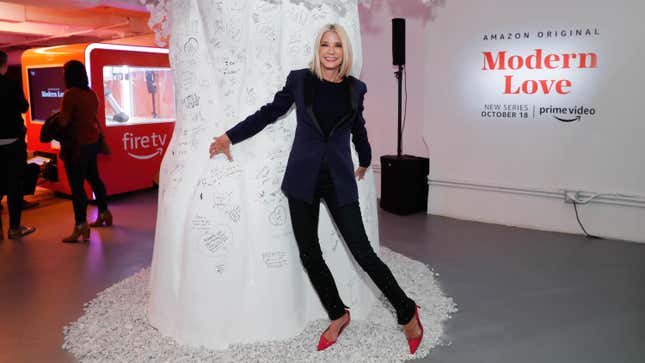Candace Bushnell Didn’t Think Sex and the City Was ‘Feminist’
This does not matter, but okay, sure, maybe it does
EntertainmentTV

Arguing about whether or not Sex and the City was feminist or not is a pointless endeavor, because any shred of feminism one might find in Carrie Bradshaw and pals’ paean to New York and the single life circa the early 2000s is very much in the eye of the beholder. However, if you are the sort of person who requires the creator of the art you consume to weigh in, then Candace Bushnell, the woman responsible for Carrie Bradshaw, is here.
In an interview with the New York Post, Bushnell offered her thoughts on Sex and the City’s feminism, ahead of the release of the much–ballyhooed reboot, And Just Like That…, which is coming to a television near you at some point in December. Bushnell has come to peace with the character she created, “the nonexistent-in-reality Carrie Bradshaw,” and would like to impress upon those that have treated Sex and the City like a handbook for living life as a single woman to consider a reality check. Sex and the City is fiction, Carrie Bradshaw isn’t particularly aspirational, and oh, in case you were wondering, the show itself is not feminist.
Here she is:
“The reality is, finding a guy is maybe not your best economic choice in the long term. Men can be very dangerous to women in a lot of different ways. We never talk about this, but that’s something that women need to think about: You can do a lot less . . . when you have to rely on a man,” Bushnell told The Post. “The TV show and the message were not very feminist at the end.
“But that’s TV. That’s entertainment. That’s why people should not base their lives on a TV show.”
Part of Bushnell’s argument for the non-feminism of the show points towards the end, where Carrie finally ends up with Mr. Big, which is what she wanted all along. Parsing her thinking here, a woman needs a man like a fish needs a bicycle, ladies!! Arguably, this is true, so ten points to Bushnell there. Ten additional points to Bushnell for elucidating the argument that finding and latching on to a man for the foreseeable future isn’t necessarily the “best economic choice in the long term,” because that is a statement that could stand to get some more air! However, the feminism of Sex and the City is an age old argument, bandied about since at least 2008, when Alice Wignall noted for the Guardian on the occasion of the first Sex and the City movie, that just because the show is centered around the lives of four women, their main concern appears to be men.
Though I am loathe to admit that I think of this episode often, Carrie’s storyline in the 2003 installment “A Woman’s Right to Shoes” gestures towards feminism before swinging back to its comfort zone: Carrie, incensed that her Manolo Blahniks were stolen at a shoes-off baby shower, demands that the host of the shower pay for her missing shoes, and then goes as far to register for the shoes in question, in response to being “shamed” for being single. The shame attached to being single is the show’s strongest through line, as it is the silent and invisible enemy these women battle everyday. Is it feminist to start a registry for yourself for just existing independently, untethered from the constraints of traditional family and relationships? No, not really. A close read of the show reveals that above all, Carrie was an asshole, using her single status as cover for more unsavory parts of her personality.
If Sex and the City is anything at all, it is a very good romantic comedy stretched out over six seasons of television—a fine thing to be, nice to have around, and above all, entertaining. Technically, Sex and the City had a veneer of feminism in that it was a show where women talked frankly and graphically about sex in ways that were previously unseen in popular culture, and paid lip service to feminism in some of its plot lines. But feminism is much more complicated than a television show about women being both nice and mean to each other in equal measure. Casting any of these women’s decisions as feminist or thinking about the feminism that might exist in this fictional world takes away from the joy of watching the show itself, so maybe this time, it’s best to leave this argument in the dust, where it belongs.